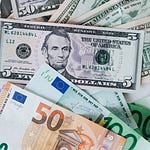In this episode, we examine the developments in the banking world in the last week or so and the implications these have on financial markets and on the Fed rate hike.
The episode is based on yesterday's newsletter which is available on Substack.
A transcript of this podcast, with relevant images and quotes, is available for all subscribers after the show notes below. Our podcast is available on Apple Podcasts, Spotify, Google Podcasts, YouTube, and Amazon Music.
Show Notes
00:00:00 Introduction
00:03:51 The Role of Small Banks
00:05:00 What will the Fed do?
00:06:35 Deglobalization Continues
00:07:09 The Consumer Keeps Spending
00:08:19 Leading and Lagging Indicators
00:09:44 Conclusion
Introduction
[00:00:00] Scott: Welcome everyone to a new episode of The Transcript podcast. You've got me, Scott Krisiloff, I'm editor of The Transcript, along with Eric Mokaya who's our lead author. We sent out a new issue of the newsletter yesterday and the world was still grappling with the Silicon Valley Bank failure and really not necessarily even the Silicon Valley Bank failure itself, but the contagion that's spread within the banking system from that failure. And so I think a lot of attention on First Republic, on Credit Suisse around the world. There were rescues of both institutions last week and going into this week, First Republic is down, the stock is down as we're recording this on Monday morning. And so people are still trying to figure out, how much farther does this spread? Is this a financial crisis? And what are the impacts on the economy and Fed policy with respect to interest rate increases in the economy? Because the focus had been on inflation up until about two weeks ago. Erick, any thoughts on what's going on?
"Yes. I think if you'd asked me this question last week, you get a different answer than what you get today because I do think the world has changed quite a bit in the past 7 days...I would say that the events of the past 24 hours continue to add some of that extra volatility into the mix." - Affirm Holdings CFO Michael Linford
[00:00:56] Mokaya: Yeah, I think it's a tough time, especially for the Fed, which is also meeting this week.
So lots of stuff to consider. Lots of banks are in crisis. I think First Republic is like the poster child now for what will happen in the markets. I think, as you say, it's down significantly today. Lots of bankers asking whether this is a repeat of 2008. Jefferies CEO was saying that this is not. And then another thing that I picked up, at least from earnings calls throughout all the earnings calls or conferences that are this week, the first question every analyst or every CEO got asked was, what's your exposure to SVB and how safe are the deposits? And then one of the questions of course Wise in London was talking about even customers now want to know where do you keep my deposits? So they had to actually put out a blog to explain okay, we bank with this one and this one. So I think it's a bit more scrutiny around banks and right now the worst the bank can do is for something negative to happen about any bank in the system because it's so fragile that if something happens, everyone focuses on that bank very quickly. Those are some of the key pickings. What's your perception from where you are at?
[00:02:04] Scott: I think it is legitimately pretty bad for the banking system right now. One thing that's really stuck with me was the conversation that we had with Mark on our Twitter spaces last week and really driving home that this is a question about uninsured deposits around the banking system. Deposits obviously are core and fundamental to banking as a business model generally. And so if we have questions around the safety of deposits that's really dangerous for banking as a business model in general. And so this is something that is very concerning and uninsured deposits specifically, like as we're seeing it at First Republic, I don't think there's anything necessarily wrong with having uninsured deposits, but it isn't totally rational as a banking customer to have uninsured deposits. It actually makes much more sense to have any deposits that are over the FDIC threshold in money market funds or where there is exposure to more counterparties, not concentrated counterparty risk in a single bank. And there is a rational reason for anybody who had uninsured deposits to be moving them away from a direct deposit banking institution and into more of a money market fund. And that in the longer term could end up restricting credit availability, especially in real estate segments and for small and medium-sized industrials who bank with these small and mid-sized banks. If those banks don't have the deposit, the non-interest-bearing deposit basis that they used to have, it will be hard for them to be able to stay in business in the same way, even over the medium, longer term. I don't want to be bombastic. But yeah, this is a tough one.
The Role of Small Banks
[00:03:51] Mokaya: It is a tough one. I was looking at some statistics last week about small banks, especially in the US which are most vulnerable at this point in time, and which I think were asking the Fed through a letter this past week that they can have all their deposits be backstopped at the Fed. So generally like to be deemed insured. So I think the statistics will include banks with less than 250 billion in assets. They account for around 50% of commercial and industrial lending, 60% of residential real estate lending. 80% of commercial real estate lending and 45% of consumer lending in the US. So it's pretty a substantial part of the economy. And this past week, I think there's been a huge focus on what their role is in the economy and what exactly would happen, especially if people pull deposits from them and then take them to the JP Morgans and the Bank of Americas of this world. So think, are you going to have risk more concentrated, this seems at the end of the day, again, and then that also raises the risk that if one of these falls it's actually going to be much worse for the economy. So I don't know what that means for the ecosystem as a whole.
If all the money moves towards the big banks. It's a bit of a challenging time. Any other picking that you had maybe from the action?





What will the Fed do?
Do you think the Fed this week could be inclined to raise rates now that they've seen the totality of what is happening in the ecosystem?
[00:05:05] Scott: It's a big question, right? This is what we're all waiting for this week to get some sort of signal from the Fed and Powell as to how they are balancing inflationary forces against what's going on in the financial system.
What's going on in the financial system is potentially very dangerous to the economy. Obviously, this is a huge part of the Fed's mandate is financial stability and it's just there's still a visceral response and emotional reaction and memory to what happened in 2008, and so I think that nobody at the Fed is going to want to see a repeat of the financial crisis.
That's said, on the other side inflation it's definitely moderating, but it's still there in a big way. I think we see companies on the good side say moderating it's the services side, which the Fed was really honed in on and had been communicating the markets that they were honed in on that isn't really going away. CPI, even 6%, yes, that's down, that's lowest in many months, but that's still extremely high, way outside of their 2% target. Psychologically, the whole banking crisis, this mini-crisis or whatever we're in I think that psychologically is weighing more heavily just on the zeitgeist than inflation right now. And so maybe that impacts the Fed this week.
[00:06:21] Mokaya: Yeah. Yeah. I think from earnings calls, you can definitely tell. All the talk this week was about banks and the banking crisis. Inflation took a back seat for once in quite a year. It took quite the force, kind of banking crisis to make people forget a bit about inflation.
Deglobalization Continues
But from the pickings that we had, from the few pickings here and there in terms of inflation still there subsiding. Beyond maybe the banking crisis, I think some of the things that we noted were obviously deglobalization continuing in manufacturing. I think for me the quote that stood out was NXP Semiconductor saying, we have customers who have told us point blank if we cannot manufacture certain products for us here in the US, don't even bother bidding on the program. That sounds very forceful in terms of where people want their manufacturing to be located. For me, that's something that stood out. Anything that stood out for you?
The Consumer Keeps Spending
[00:07:09] Scott: I think just this stuff that's going on in the banking system is overwhelming. It's the banking system offset with Fed policy. It's just so central to what's going on in capital markets that it's hard to really focus on anything else and think that anything else is super important. I think the inflation side, which we've been following for a long time, is gonna be heavily driven by what's going on with the consumer. And I think there was one quote in the consumer section, which we held for premium subscribers that was from Kroger, talking about how consumers really are starting to trade down using coupons, more trading at a private label. And then I think it was Dollar General as well, that was saying that they're seeing pressure in their consumers. And Kroger was also saying people are eating at home more. And I think that this is something that really is starting to happen. I think consumers are really starting to feel pressure. I think inflation really is starting to become a bit overwhelming for the consumer. And we know that excess savings is starting to get depleted from basically the covid era stimulus. And so I think there are real changes going on in the consumer and this banking crisis probably doesn't help impact psychology, all that. But there's still just this inertia to inflation.
"The news is full of bank noise today. And so there's plenty to be paying attention to. But our view on our industry is travel will be very strong and travel continue to move. We expect consumers' desire and demand for travel to continue to build this year. We're seeing that, as I said at the start of the year." - Samsonite International SA CEO Kyle Gendreau
Leading and Lagging Indicators
[00:08:19] Mokaya: I think it's a rough time. Generally. I wouldn't want to be Jerome Powell this week. You're facing for the first time reporters this week and have a barrage of questions about what's happening in the markets, and then how that factors in into your inflation data. The back of mind as you say, like our data is showing us clearly the consumer is still spending. And then there's a banking crisis that you have to deal with. So you have to kind of balance because increasing rates would mean a bit more pressure on the banking side. At the same time, increasing rates would also put a big pressure on inflation over here. So it's a tough one.
[00:08:50] Scott: It's a question of leading and lagging indicators. The Fed is actually one of the biggest laggards in the economy in terms of the data that they look at in order to adjust their monetary policy in terms of inflation and the state of labor markets and unemployment, are really the things that really get them to respond to a crisis. And so you've got down on the one hand and you've got leading indicators. Capital markets have been shut and selling off for over a year now, and you're seeing a banking crisis, and the Fed is still stuck behind these lagging indicators that haven't moved. There's a good case to be made that there's this big earthquake that's just rumbling underneath the economy that the Fed is not seeing yet, not picking up in their measures. And by the time they do, it could become really big. I really hope that's not the case. Hopefully, this resolves without something like that.
Conclusion
[00:09:44] Mokaya: Hopefully it does. As it continues, it’s going to be a bit of a dance of, as you say, fire and ice, as our newsletter indicated this week. So let's hope it doesn't break a lot of stuff as they keep raising rates. And let's look out for the earnings calls this week, and definitely also the press conference of Jerome Powell this week. We'll definitely be taking a few notes from that. So on that note, we close for this week.
[00:10:06] Scott: I think that sounds good.
[00:10:09]Mokaya: All right. Thank you. Thank you for joining us. See you again next week for another edition of The Transcript podcast. Keep following us, keep sharing us and keep it locked here. Bye for today.













